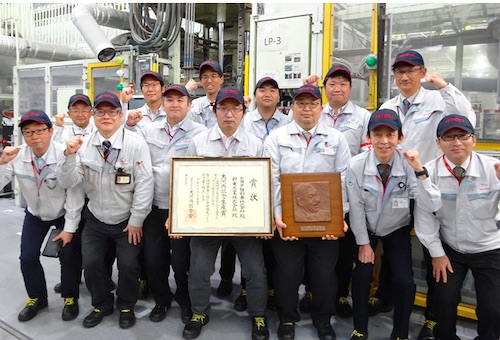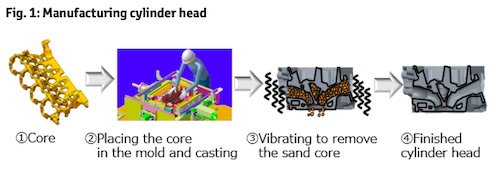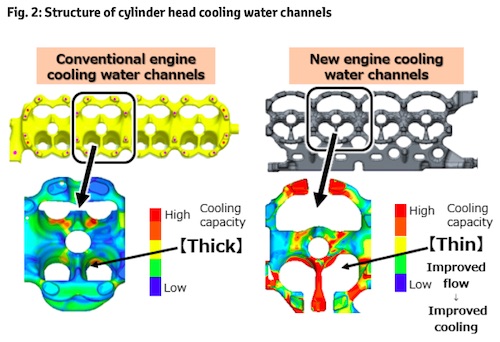Toyota Awarded the 66th Okochi Memorial Production Prize for the Development of an Aluminum Casting Technology
- Written by ACN Newswire - Press Releases
|
|
| Group Photo |
|
|
|
|
|
|
Toyota is implementing initiatives to achieve the "Plant Zero CO2 Emissions Challenge," which is one of the targets in the Toyota Environmental Challenge 2050, announced in 2015. As the electrification of vehicles proceeds, engines will also have to evolve, such as through the use of technologies to achieve high thermal efficiency. For these two reasons, Toyota developed the aluminum casting technology that received this prize.
Toyota received this prize for a world-first aluminum casting technology for cylinder heads*3, which affect engine performance. The cooling water channels of a cylinder head are normally formed using molds made from sand and adhesive, known as a core. The technology commonly used to make cores at present employs an organic material called phenolic resin as the adhesive. However, the casting process produces strong odors and smoke, giving rise to the issue of large deodorization equipment required to deal with the odorous gas by-products.
Manufacturing cylinder head
On the other hand, increased cooling capacity of the cylinder head is necessary for improving engine performance, and this requires thinner and more complex cooling water channels. Also, using inorganic material as the adhesive is an effective way of eliminating smoke and odor, but there was previously no method of manufacturing cores that would allow for complicated shapes and reuse of sand.
Structure of cylinder head cooling water channels
The aluminum casting technology developed by Toyota uses the inorganic material, water glass, which does not cause odors or smoke. Moreover, this world-first technology enables complex shapes to be created and the sand to be reused. Using water glass, which is not subject to thermal degradation, to adhesive the sand has succeeded in reducing odor concentrations during the casting process to 1/100th or less, thereby reducing the investment required in deodorization equipment. Also, the action of surfactants creates a mousse-like consistency that improves the flowability of the sand, which enables the creation of thin and complex cooling water channels in the cylinder head. This is contributing significantly to mass production of new model engines with thermal efficiency of 41 percent. The temperature at which the sand is processed was also reduced, with the effect of more than halving the CO2 emissions of traditional methods.
Comparison of sand flowability
Cylinder heads made using this technology are currently in use all around the world. Going forward, Toyota will extend this technology both internally and to other companies as well, and will take on new challenges to contribute to the realization of a sustainable society through efforts to bring about positive effects to the earth and society.
(1) Jointly developed with SINTOKOGIO, Ltd.(2) Including the Okochi Memorial Grand Production Prize, Okochi Memorial Production Prize, Okochi Memorial Technology Prize(3) Together with the cylinder block, the cylinder head is one of the parts that form the body of the engine. It is an important part that affects engine performance.
About Toyota Motor Corporation
Toyota Motor Corporation (TMC) is the global mobility company that introduced the Prius hybrid-electric car in 1997 and the first mass-produced fuel cell sedan, Mirai, in 2014. Headquartered in Toyota City, Japan, Toyota has been making cars since 1937. Today, Toyota proudly employs 370,000 employees in communities around the world. Together, they build around 10 million vehicles per year in 29 countries, from mainstream cars and premium vehicles to mini-vehicles and commercial trucks, and sell them in more than 170 countries under the brands Toyota, Lexus, Daihatsu and Hino. For more information, please visit www.toyota-global.com.
Copyright 2020 JCN Newswire. All rights reserved. www.jcnnewswire.com
Authors: ACN Newswire - Press Releases
Read more //?#





